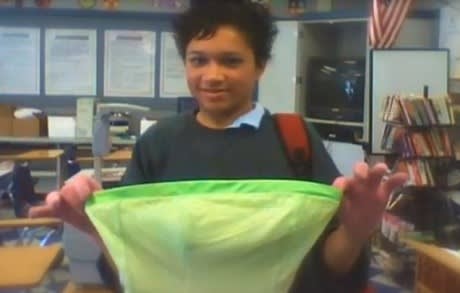In 2008, California elementary school student Brandon McInerny shot classmate Lawrence King twice in the back of the head. The unspeakable act was carried out in the school's computer lab, shocking the teacher and fellow student witnesses with a tragic murder that would forever impact their own lives.
Director Marta Cunningham places this horrifying tale under the microscope in Valentine Road, examining the lives of both the shooter and the victim, questioning the reason behind violence between adolescents.
Was this a hate crime? King, a youth that was in the process of coming to terms with his transgendered tendencies, began wearing makeup and women's clothing to school and made the unfortunate mistake of expressing his feelings for a classmate. King asked McInerny (a fellow male classmate) if he would be his Valentine in front of their peers, causing a great deal of embarrassment and dismay.
Was this an instance of "gay panic?" The defendant's legal team puts forth the idea that King was being incredibly flamboyant, forcing his feelings and beliefs on to someone that was not receptive, which borders on sexual harassment. McInerny eventually reached a place where he believed that violence was the only escape.
Cunningham navigates the tragedy, recounting the backstories of the boys and finds parallels between the two; King was a neglected foster child that bounced around homes, while an abusive father and a drug-addicted mother raised McInerny. Through a series of talking head interviews with the boys' classmates, friends and family, we are given a better understanding of who the two were and how their child-rearing had an impact on the trajectory of their lives.
What sets this documentary apart from other chronicles of violence is that Cunningham avoids demonizing McInerny. Similarly, it doesn't sanctify King, opting instead for an evenly balanced examination of two boys that were failed by adults throughout their lives. The views and opinions are presented in an unbiased manner, allowing us to form our own judgment rather than having it dictated by didactic.
Looking beyond the specific act of violence, discussions of gay and transgendered teens are surveyed and how the school system is coping—or failing—to accommodate and promote tolerance. Regarding McInerny's court case, serious questions are raised over how personal beliefs still play a serious role in the decisions made by a jury and how, in some instances, a fair trial is impossible (McInerny's court case ended in a deadlocked jury).
Valentine Road is a poignant look at a tragic issue that continues to plague America; one that sees youths constantly at odds with each other over sexual preference and intolerance. At President Obama's recent inauguration speech, he pointed out, America's "journey is not complete until our gay brothers and sisters are treated like anyone else under the law," making Cunningham's film even more relevant in today's social and political arenas.
(HBO Documentaries)Director Marta Cunningham places this horrifying tale under the microscope in Valentine Road, examining the lives of both the shooter and the victim, questioning the reason behind violence between adolescents.
Was this a hate crime? King, a youth that was in the process of coming to terms with his transgendered tendencies, began wearing makeup and women's clothing to school and made the unfortunate mistake of expressing his feelings for a classmate. King asked McInerny (a fellow male classmate) if he would be his Valentine in front of their peers, causing a great deal of embarrassment and dismay.
Was this an instance of "gay panic?" The defendant's legal team puts forth the idea that King was being incredibly flamboyant, forcing his feelings and beliefs on to someone that was not receptive, which borders on sexual harassment. McInerny eventually reached a place where he believed that violence was the only escape.
Cunningham navigates the tragedy, recounting the backstories of the boys and finds parallels between the two; King was a neglected foster child that bounced around homes, while an abusive father and a drug-addicted mother raised McInerny. Through a series of talking head interviews with the boys' classmates, friends and family, we are given a better understanding of who the two were and how their child-rearing had an impact on the trajectory of their lives.
What sets this documentary apart from other chronicles of violence is that Cunningham avoids demonizing McInerny. Similarly, it doesn't sanctify King, opting instead for an evenly balanced examination of two boys that were failed by adults throughout their lives. The views and opinions are presented in an unbiased manner, allowing us to form our own judgment rather than having it dictated by didactic.
Looking beyond the specific act of violence, discussions of gay and transgendered teens are surveyed and how the school system is coping—or failing—to accommodate and promote tolerance. Regarding McInerny's court case, serious questions are raised over how personal beliefs still play a serious role in the decisions made by a jury and how, in some instances, a fair trial is impossible (McInerny's court case ended in a deadlocked jury).
Valentine Road is a poignant look at a tragic issue that continues to plague America; one that sees youths constantly at odds with each other over sexual preference and intolerance. At President Obama's recent inauguration speech, he pointed out, America's "journey is not complete until our gay brothers and sisters are treated like anyone else under the law," making Cunningham's film even more relevant in today's social and political arenas.
